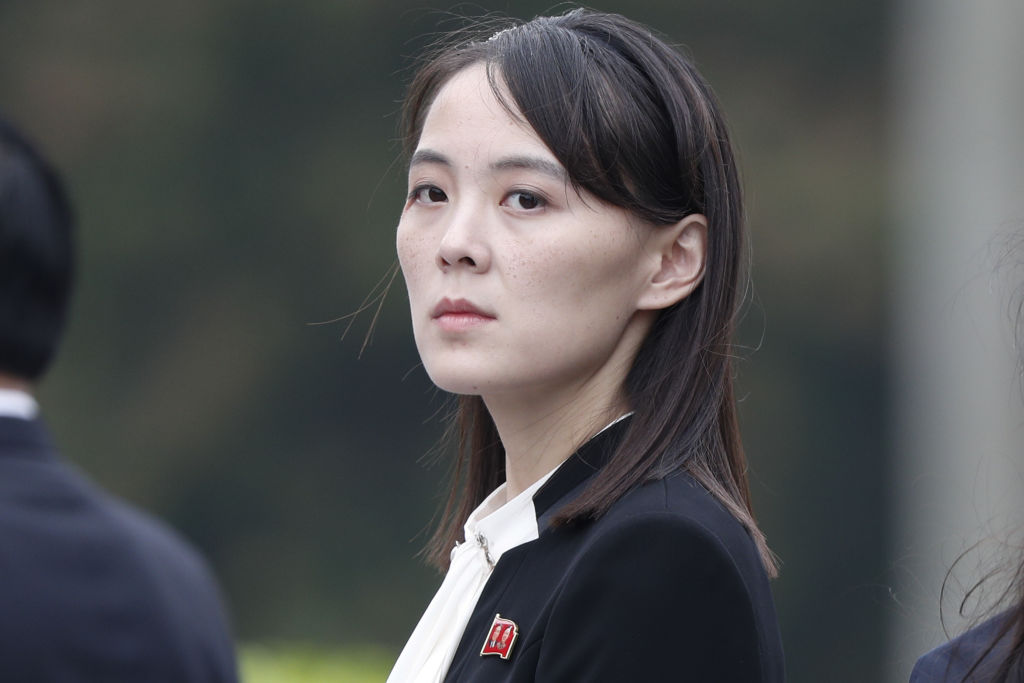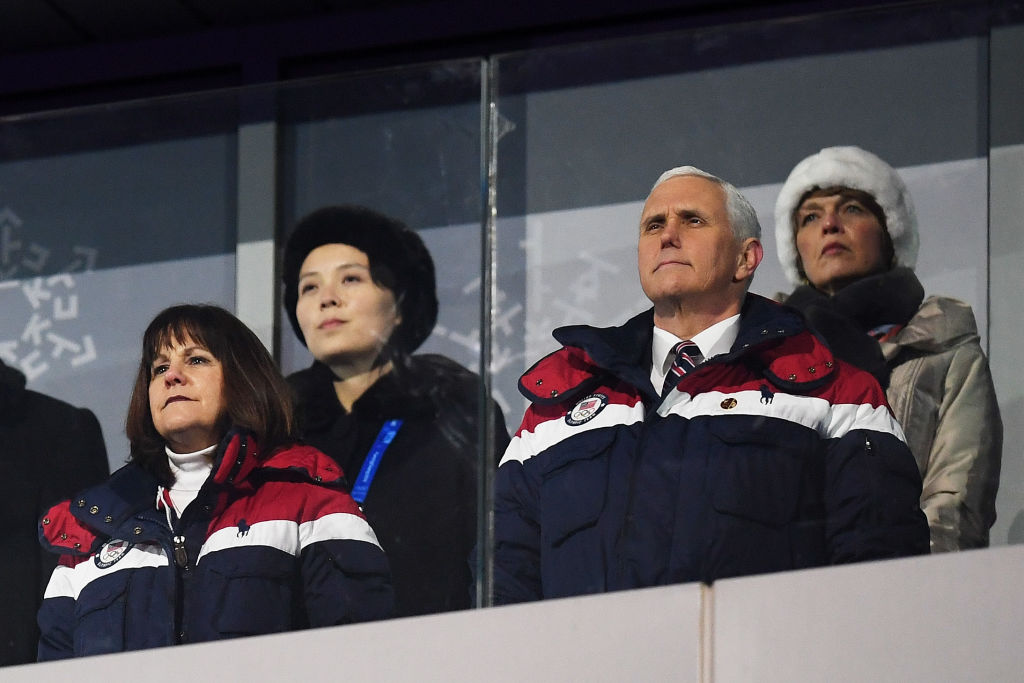
Unconfirmed reports about Kim Jong Un’s health have been shrouded in even more than the customary North Korean murkiness. But out of the fog of questions, one name keeps cropping up as policymakers and analysts contemplate who else might lead the reclusive nuclear-armed nation: Kim Yo Jong.
She’s Kim Jong Un’s younger sister, and many observers say she could be the most likely choice. However, the speculation raises another big question: Could a woman, even the sister of the current leader, ever lead North Korea?
North Korea watchers began to speculate whether something had happened to Kim Jong Un after he missed the April 15 commemoration of the birthday of his grandfather, North Korea founder Kim Il Sung. He hasn’t missed the event since assuming power in 2011, after his father died from a heart attack. The speculation reached a fever pitch over the weekend with a fresh round of unconfirmed reports.
The disappearance came amid recent missiles launches and the North’s repeated claims that there are no coronavirus cases in the country—an assertion international health experts doubt.
South Korea, for its part, has repeatedly said there is no sign of “unusual developments” in the North. Moon Chung-in, the top foreign policy adviser to South Korean President Moon Jae-in, told CNN that the leader is “alive and well.”
But, there appears to be no formal succession plan in place in North Korea. Kim is believed to be in his mid-30s, but he is a heavy smoker, and some medical experts have suggested that he is obese and unhealthy. All of which means, even if Kim emerges unscathed into the public view in near future, attention will remain on Kim Yo Jong and others who might be prepared to succeed him.
Who is Kim Yo Jong?
Kim Yo Jong, who is thought to be in her early thirties, is one of several children of the late North Korean leader Kim Jong Il. She is believed to be one of her brother’s closest and most trusted aides.
“She is, as best we can tell, a very capable and high-skilled member of the North Korean leadership—and is not one to underestimated by any stretch of the imagination,” Harry J. Kazianis, the senior director of Korean Studies at the Washington D.C- based think tank the Center for the National Interest, tells TIME.
She was born and raised mostly in Pyongyang, but is believed to have spent about four years of elementary school in Switzerland, according to the website North Korea Leadership Watch, an affiliate of 38 North, a North Korea monitoring project.
She is married to Choe Song, who is believed to be the son of Choe Ryong Hae, “one of the most powerful officials in [North Korea’s] formal hierarchy,” according to North Korea Leadership Watch.
She was largely unknown to the world until she was photographed at her late father’s 2011 funeral. But she has gained international attention since being thrust into the spotlight when she attended the 2018 Winter Olympics in Pyeongchang.

She was also spotted with her brother at the summit in Vietnam with U.S. President Donald Trump in February 2019—social media users circulated memes of Kim Yo Jong “lurking” near her brother after she was photographed standing around a corner and behind bushes while he conducted business.
In her official capacity, Kim Yo Jong is the Vice Director of the Workers’ Party of Korea Propaganda and Agitation Department, the agency primarily responsible for censorship in the country. In April, she was reappointed as an alternative member to the powerful decision-making body, the Politboro of the Central Committee. She was previously dismissed from the committee, possibly as a result of the failure of the Vietnam summit, according to the Seoul-based NK News, which provides news and analysis on North Korea.
Could a woman lead North Korea?
Despite Kim Yo Jong’s pedigree, there would be many obstacles to a woman taking control, experts say. North Korea is a highly patriarchal society. Since its establishment in 1948, the country has been run by three men, Kim Il Sung, his son Kim Jong Il, and his grandson, Kim Jong Un.
“It’s definitely possible that she would face some serious challenges to her legitimacy and power if she took over, even with the Kim family name,” Mintaro Oba, a former U.S. State Department official who specialized in the Koreas, tells TIME.
Scott A. Snyder, senior fellow for Korea studies and director of the U.S.-Korea policy program at the Council on Foreign Relations, tells TIME that since the recognized line of succession in the Kim dynasty is father-to-son, Kim might serve “as a sort of regent and de facto leader in the absence of a viable successor.”
But, he says, the Kim family dynasty is “more vulnerable than ever before.”
Although details about Kim Jong Un’s family are closely guarded, some believe that Kim Jong Un may have a young son who could take over when he is old enough. Another possible successor is Kim Pyong Il, who is Kim Jong Un’s uncle (Kim Il Sung’s son and Kim Jong Il’s half-brother). Despite spending 40 years overseas as a foreign diplomat, he reportedly remains popular in the country owing to a resemblance to Kim Il Sung.
Lami Kim, a former South Korean diplomat and fellow at the Wilson Center says that there is much speculation over why he returned to North Korea last year. “One scenario is that Kim Jong Un has been concerned about his own health and what would happen to his family and the regime should he die,” she says. “So perhaps he recalled his uncle either to succeed him, or to help Kim Yo Jung run the country.”
Kim Jong Chul, Kim Jong Un’s older brother, who is best known for his love of the British guitarist Eric Clapton, is another a possible successor. He was passed over for leadership when his father died. “Until now, he hasn’t been considered leadership material,” says Lami Kim. “If Kim Jong Un were to die unexpectedly, I suppose it is possible that the North Korean elites would consider him for a figurehead position, though, at least for awhile.”
Daniel Pinkston, a North Korea specialist at Troy University in Seoul believes Kim Yo Jong’s gender would prevent her from taking total control in North Korea.
He says her father-in-law, Choe Ryong Hae, is the most likely successor. He is older, male and came up through the party and mass organizations, Pinkston says.
But, North Korea has been ruled by the same family since its founding, and North Korean citizens revere the family as god-like figures. The Kim regime is a hereditary dynasty which claims its divine bloodline (called the “Paektu bloodline,” after the extinct volcano considered to be the birthplace of the Korean people) gives it the right to rule. That means that anyone outside the Kim family may struggle with legitimacy.
Others are more certain that the future of the Hermit Kingdom lies in the hands of the younger Kim.
“What is important in [North Korea] is not whether the successor is a male of a female, but whether the successor is [from the Kim bloodline],” says Jung-Chul Lee, a professor at Soongsil University.
Kazianis, of the Center for the National Interest, adds: “I have no doubt that if Kim Jong Un were to drop dead right now—or already has—Kim Yo Jong would be the only person to take over the country. Period.”
What would it mean for the world if Kim Yo Jong took over?
Several experts tell TIME that a change in power may cause North Korea to look inward during the power transition.
Oba, the former State Department official, says that if Kim Yo Jong were to take the reins, she would likely focus on consolidating her power, warding off threats and demonstrating strength—much as Kim Jong Un did when he assumed control in 2011.
“There’s a good chance they’d initially favor policy continuity, limiting risks on outside diplomacy, and even nuclear and missile tests and other military provocations,” he says.
Kazianis says that a new leader would likely face an internal power struggle which would distract from paying much attention to the outside world for several months. But, he says, once the dust settles, not much is likely to change.
“When North Korea reemerges, their goal would still be the same: to slowly get America to accept them as a nuclear power and lift international sanctions,” he says. “And that means the same tensions between and Pyongyang and Washington would most likely remain.”
Others say that much uncertainty looms over the future of North Korea. “The main challenge from a global perspective is that implications of transition are not clear and there is much uncertainty about what might happen as things sort themselves out,” says CFR’s Snyder.
—With reporting by Hillary Leung.
Correction, April 28
The original version of this story misstated what Daniel Pinkston said about Choe Ryong Hae. Pinkston said that he came up through the party and mass organizations, not that he “came up through the military.”
More Must-Reads From TIME
- The 100 Most Influential People of 2024
- Coco Gauff Is Playing for Herself Now
- Scenes From Pro-Palestinian Encampments Across U.S. Universities
- 6 Compliments That Land Every Time
- If You're Dating Right Now , You're Brave: Column
- The AI That Could Heal a Divided Internet
- Fallout Is a Brilliant Model for the Future of Video Game Adaptations
- Want Weekly Recs on What to Watch, Read, and More? Sign Up for Worth Your Time
Write to Amy Gunia at amy.gunia@time.com